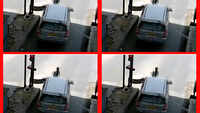NGT panel to raid more polluting units in Punjab, Himachal Pradesh
TNN | Apr 16, 2019, 10:37 IST During some recent raids certain industries in Chandigarh and Panchkula were caught not using effluent treatment plants.
During some recent raids certain industries in Chandigarh and Panchkula were caught not using effluent treatment plants.CHANDIGARH: The executive committee appointed by the National Green Tribunal (NGT) to monitor and control pollution levels in the Ghaggar is likely to raid more water polluting industries in Punjab and Himachal Pradesh.
On Friday, a team of the executive committee headed by chairperson Justice Preetam Pal raided two water polluting industries in Chandigarh and seven in Panchkula the next day. Justice Pal found the treatment plants in all these electroplating industries non-functional and had slammed officials of the pollution control board/committee for being negligent in the matter. However, T C Nautiyal, member secretary of the Chandigarh Pollution Control Committee (CPCC), said none of the small electroplating units were operating without the mandatory effluent treatment plants (ETP) being in running condition in Chandigarh. He further said he was yet to get the report from the committee and was prepared to take action according to the committee's direction and recommendations.
Justice Pal told TOI that, "We found none of the treatment plant operational. Since these ETPs consume electricity, so their use was bypassed and the waste was being dumped into drains, which eventually merged with the Ghaggar and became disastrous for the survival of aquatic life, other animals and cattle and people dependent on it." He said that a report would soon be sent to the pollution control departments, which may close down these factories, prosecute the operators or charge environment compensation amount from them. He also slammed the regional officials, saying that they too should be held responsible for allegedly being in connivance with those concerned and overlooking the malfunctioning of these industries and recommended mention of dereliction in their annual confidential report. He added that in the coming days his team would pay surprise visits to the industries in HP and Punjab.
Nautiyal said the Chandigarh Pollution Control Committee was ready to explain to the executive committee that the electroplating units, which were raided, had functional ETPs. "There are 100 small electroplating units in Chandigarh, which do not run ETP on daily basis as they need storage water, which on getting dirty is accumulated at a threshold point in a few days to use the ETP to treat it. It is quite possible when the team of executive committee made the surprise check without our officials, the ETP was not being run. Unlike solid treatment plant or a big ETP, the smaller ones do not operate all the time," he said, adding that none of the units are permitted to operate without ETP in the city limits.
According to the team, it had also visited Sukhna and N-choes, Nautiyal said the team was satisfied but had initially expressed some reservation on spotting brackish water.
On Friday, a team of the executive committee headed by chairperson Justice Preetam Pal raided two water polluting industries in Chandigarh and seven in Panchkula the next day. Justice Pal found the treatment plants in all these electroplating industries non-functional and had slammed officials of the pollution control board/committee for being negligent in the matter. However, T C Nautiyal, member secretary of the Chandigarh Pollution Control Committee (CPCC), said none of the small electroplating units were operating without the mandatory effluent treatment plants (ETP) being in running condition in Chandigarh. He further said he was yet to get the report from the committee and was prepared to take action according to the committee's direction and recommendations.
Justice Pal told TOI that, "We found none of the treatment plant operational. Since these ETPs consume electricity, so their use was bypassed and the waste was being dumped into drains, which eventually merged with the Ghaggar and became disastrous for the survival of aquatic life, other animals and cattle and people dependent on it." He said that a report would soon be sent to the pollution control departments, which may close down these factories, prosecute the operators or charge environment compensation amount from them. He also slammed the regional officials, saying that they too should be held responsible for allegedly being in connivance with those concerned and overlooking the malfunctioning of these industries and recommended mention of dereliction in their annual confidential report. He added that in the coming days his team would pay surprise visits to the industries in HP and Punjab.
Nautiyal said the Chandigarh Pollution Control Committee was ready to explain to the executive committee that the electroplating units, which were raided, had functional ETPs. "There are 100 small electroplating units in Chandigarh, which do not run ETP on daily basis as they need storage water, which on getting dirty is accumulated at a threshold point in a few days to use the ETP to treat it. It is quite possible when the team of executive committee made the surprise check without our officials, the ETP was not being run. Unlike solid treatment plant or a big ETP, the smaller ones do not operate all the time," he said, adding that none of the units are permitted to operate without ETP in the city limits.
According to the team, it had also visited Sukhna and N-choes, Nautiyal said the team was satisfied but had initially expressed some reservation on spotting brackish water.
Making sense of 2019
#Electionswithtimes
View Full Coverage



































All Comments ()+^ Back to Top
Refrain from posting comments that are obscene, defamatory or inflammatory, and do not indulge in personal attacks, name calling or inciting hatred against any community. Help us delete comments that do not follow these guidelines by marking them offensive. Let's work together to keep the conversation civil.
HIDE